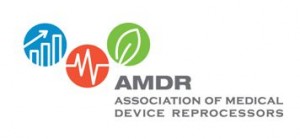FDA stringently regulates reprocessed medical devices and has long held that reprocessed devices are “as safe and as effective as a new device.”
(Washington, DC) – The Association of Medical Device Reprocessors (AMDR), the trade association representing the FDA-regulated, third-party medical device reprocessing industry, is providing this response to a recent position statement from the Society of Gastroenterology Nurses and Associates, Inc. (SGNA). AMDR believes it is essential that clinicians and other stakeholders have accurate and unbiased information on the safety data of reprocessed and remanufactured “single-use” devices (SUDs).
In the United States (U.S.), evaluation of the safety and effectiveness of all medical devices is the purview of the Food and Drug Administration (FDA). Reprocessed devices, just like all medical devices, are subject to FDA’s full set of medical device manufacturer requirements – including premarket review requirements. In obtaining premarket clearance from FDA, medical device reprocessors have irrefutably demonstrated that their products have been cleared by the agency as “substantially equivalent” to the original manufacturers’ predicate devices and are therefore safe, effective and legally marketable in the U.S.
SGNA’s position statement illogically concludes that “in the absence of substantial scientific evidence to provide the safety and effectiveness of reprocessed critical medical devices in the endoscopy setting, SGNA maintains the position that critical medical devices manufactured and labeled for single use should not be reused.” This conclusion fails to acknowledge the fundamental purpose and legitimacy of FDA regulation. To be lawful in the U.S., reprocessors of “single-use” devices (like all devices manufacturers) must have FDA clearance (510(k)) for all devices requiring such premarket notification (which includes all critical and semi-critical devices that may be used in the endoscopic setting). The very purpose of FDA’s 510(k) substantial equivalence process, as applied to all medical device manufacturers, including reprocessors, is to demonstrate that the device in question is “at least as safe and as effective as the legally marketed [predicate] device.”
AMDR’s members fully support FDA regulation. Despite SGNA’s claims, the scientific evidentiary standard in the U.S. has always been met for reprocessed devices. It is unclear why SGNA has chosen to disregard FDA’s findings with regard to reprocessed devices, but not other FDA-cleared or approved devices – even though the standard for both is the same. FDA’s conclusions as to medical device safety are well-established, well-respected by the clinical community, and often recognized as the international standard. AMDR is disappointed in SGNA’s public position mischaracterizing the evidence supporting the safety of single-use device reprocessing, particularly as FDA is the accepted data standard by which all others in this country rely. Other professional and clinical organizations – including the American Hospital Association, American Nursing Association, Association for Professionals in Infection Control & Epidemiology, among several others – have issued statements in support of FDA regulation of SUD reprocessing. These organizations embrace the outstanding safety record of reprocessing and understand that it’s one of the most important strategies hospitals are implementing today as a way to contain costs and support quality care enhancements.
Beyond FDA’s safety and efficacy findings, the U.S. Government Accountability Office (GAO), the investigative arm of the U.S. Congress, has looked at the practice of reprocessing SUDs twice in eight years and found no evidence of increased risk to patients. The GAO’s first examination yielded a report entitled Single Use Medical Devices: Little Available Evidence of Harm From Reuse, but Oversight Warranted (June 2000), concluding that “the safety of reprocessing some types of devices has been established by well-developed clinical studies. Studies have shown both that reprocessing procedures can be safely accomplished and that patient outcomes are not adversely affected by the use of reprocessed SUDs.”
Since the 2000 GAO report, FDA instituted a number of regulatory requirements for medical device reprocessors, as noted in a 2008 report. In fact, the most recent GAO report noted that participants in FDA’s Medical Product Safety Network (MedSun) described “that reprocessing establishments are more stringently regulated by FDA than are the manufacturers of the original devices, and this provided them a sense of confidence in the reprocessing process.”
Indeed, beyond the premarket data submitted by reprocessors and reviewed by FDA, the agency’s post market surveillance data over the last ten years also demonstrates the safety of reprocessed devices. The GAO report noted that FDA “has found no causative link between a reprocessed SUD and reported patient injury or death.” The report concluded:
After reviewing the available evidence – including FDA’s process for identifying and investigating device-related adverse events reported to involve reprocessed SUDs, peer-reviewed studies published since 2000, and the results of our and FDA’s consultations with hospital representatives – we found no reason to question FDA’s analysis indicating that no causative link has been established between reported injuries or deaths and reprocessed SUDs. – GAO, “Reprocessed Single-Use Medical Devices: FDA Oversight Has Increased, and Available Information Does Not Indicate That Use Presents an Elevated Health Risk,” at 21-22 (January, 2008).
Healthcare providers in the U.S. have a responsibility to deliver safe and effective medical care, and at the same time attempt to control spiraling costs. Third-party reprocessors are a small but strong component of the medical device industry. We empower our hospitals partners to maintain the highest quality of care standards and by reducing the costs associated with medical devices and medical waste. While reprocessing is not the single solution to solving all healthcare cost-containment problems, it is a safe and critical tool for a majority of the nation’s hospitals.
###
AMDR is a trade association representing third-party reprocessors of medical devices labeled for “single-use.” AMDR member companies serve the majority of hospitals in the U.S. and provide services for the top hospitals in the country as listed by U.S. News & World Report. For more information, visit our website at www.amdr.org

